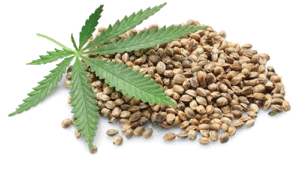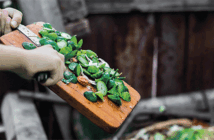
Hemp seeds are technically a nut, and may be eaten raw (de-hulled), extracted for oil, ground into a meal, sprouted, or made into a beverage (hemp milk). Hemp seeds can now be sold in food products in New Zealand (as of November 2018) and the composition of hemp products available on the New Zealand market are currently being analysed for inclusion in the next release of the New Zealand Food Composition Database (https://www.foodcomposition.co.nz/). Data from the USA shows hemp seed is a good source of oil and protein, with a number of other nutrients and bioactives that support a range of future food opportunities.
Whole hemp protein is not recognised as a complete protein, i.e. including the nine amino acids essential to the human diet. However, isolates may come closer to being a complete protein and combining hemp protein with other complementary plant proteins – including from nuts, lentils, dried beans and grains – can provide all of the essential amino acids humans need, making it a good source for new plant-based protein foods.
The recognition of hemp as a food ingredient has allowed growers to begin experimenting with hemp crops. There is an opportunity to breed and select cultivars better suited to New Zealand’s regional climates, while tailoring composition to meet consumer drivers. This will allow hemp to be grown sustainably to produce high yielding carbon-neutral food and fibre products.

Dr Kevin Sutton, Plant & Food Research science group leader, food and bioproducts technology
The discovery of natural bioactive compounds, as well as peptides that reduce blood pressure and cholesterol, in hemp seed by-products provides opportunities to develop new higher-value consumer foods. Production of high-value hemp protein isolates will require new processing knowledge to isolate hemp proteins as functional ingredients. The development of scalable food processes that allow creation of novel structures and flavours from hemp protein isolates is also a necessary step towards consumer acceptability of novel hemp foods.
Our hopes for a growing hemp food industry must also be tempered in respect of our future consumers. We need to investigate what our consumers want from plant-based foods beyond analogues of milk and meat; understand whether consumers understand the concept of a complete protein and how that might change their behaviour towards hemp foods; as well as understand how consumers in various markets differ in their preferences for plant-based food flavours, aromas and textures.




























































































